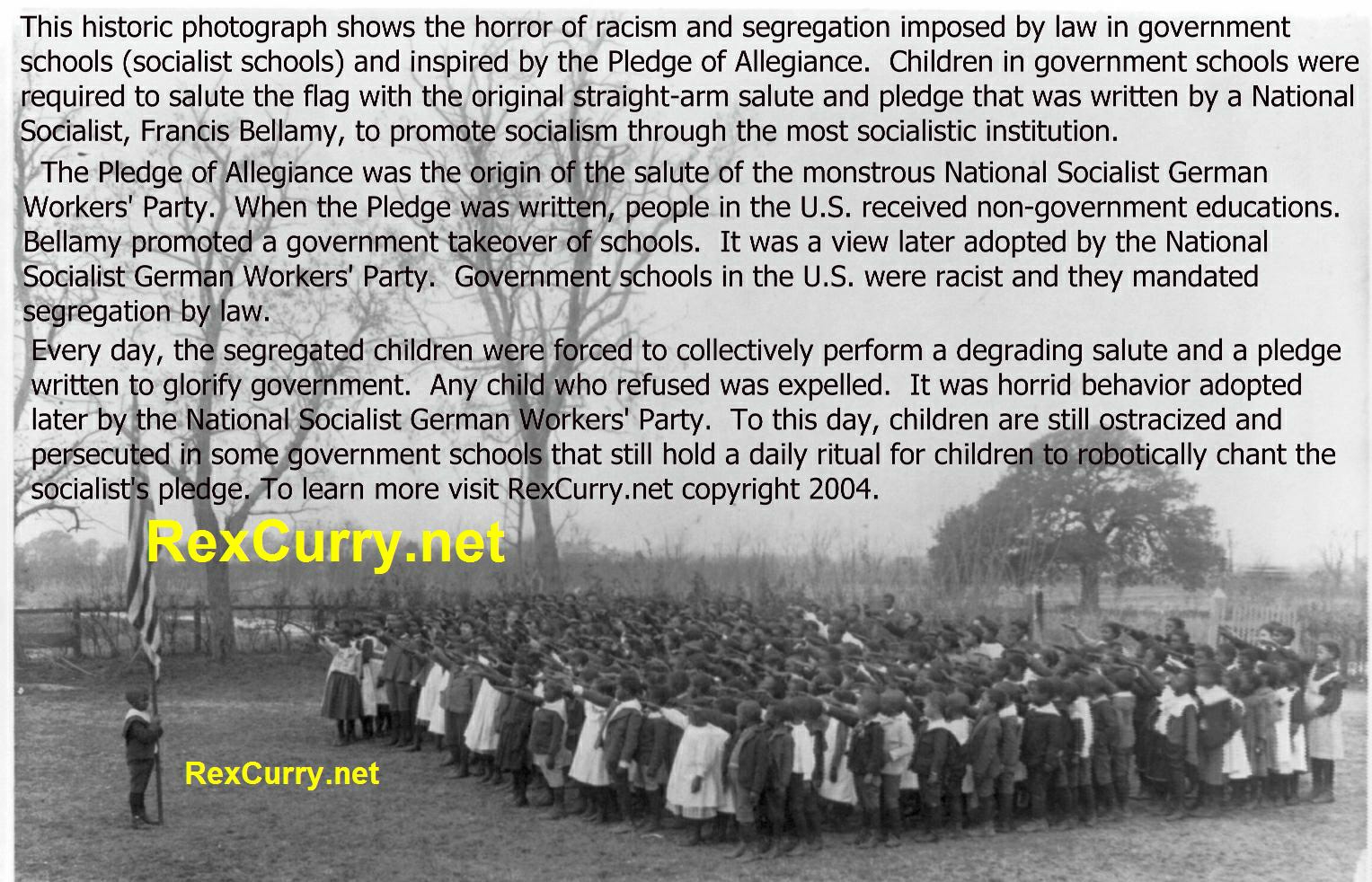
| Frightening information about the history of the
Pledge of Allegiance is at http://rexcurry.net/book1a1contents-pledge.html
(with shocking historical photographs) and for fascinating information about
symbolism see http://rexcurry.net/book1a1contents-swastika.html
|

|
By William Dean Howells
|
William Dean Howells, former editor of Boston's prestigious Atlantic Monthly, stayed at the Chelsea as he was moving to New York in order to write for Harper's magazines and lead the development of American literature in New York. At the Chelsea in 1888, he read Looking Backward, the utopian novel by his Massachusetts protege, Edward Bellamy, a self-proclaimed socialist in the Nationalism movement. Bellamy's book was a fantasy of a Henry-George-type society in which all natural resources are owned by the state. Previously a comfortable half-baked socialist, Howells became an angry activist for socialism--pushing the cause of literary realism as a tool for creating socialism, writing his own realistic novels promoting bigger government and Bellamy's authoritarian socialism. 1892 was the year that Edward Bellamy's cousin Francis Bellamy created the robotic chanting of the Pledge of Allegiance (the origin of the stiff-arm salute adopted later by German National Socialists) and it was the year that Howells wrote the novel "The Coast of Bohemia" concerning the Chelsea, and of the city's social and artistic changes, in the late 1880s Some people claim that Edward Bellamy coined the modern term "credit card" in his book "Looking Backward." Edward Bellamy was a horrid socialist and when he used the term "credit card" he was talking about a ration card under his authoritarian socialist dystopia (a system that helped to inspire the Union of Soviet Socialist Republics, etc). He hated capitalism and his use of the term credit card had nothing to do with credit cards as known under a market economy. Edward Bellamy is still popular with many groups (e.g. the Edward Bellamy Memorial Association). Pledge of Allegiance pictures http://rexcurry.net/pledge-allegiance-pledge-allegiance2.jpg and Swastika pictures http://rexcurry.net/swastika3swastika.jpg expose shocking secrets about American history. Socialists in the USA originated the Nazi salute, robotic group-chanting to flags, Nazism, flag fetishism, and the modern swastika as "S" symbolism for "Socialism." http://rexcurry.net/pledge2.html Much of that history is the history of the Pledge Of Allegiance. Those historical facts explain the enormous size and scope of government today, and the USA's growing police state. They are reasons for massive reductions in government, taxation, spending and socialism. The "Nazi salute" is more accurately called the "American salute" as it was created and popularized by national socialists in the USA. It was the early salute of the Pledge of Allegiance. The Pledge was written by Francis Bellamy. http://rexcurry.net/pledgetragedy.html Francis Bellamy was cousin and cohort of Edward Bellamy. http://rexcurry.net/pledgebackward.html Edward Bellamy and Francis Bellamy were self-proclaimed socialists in the Nationalism movement and they promoted military socialism. They wanted the government to take over education and use it to spread their worship of government. When the government granted their wish, the government’s schools imposed segregation by law and taught racism as official policy. The official racism and segregation was a bad example three decades before the National Socialist German Workers Party, and decades afterward. The Pledge was mandated by law in government schools for three decades before, and through, the creation of the National Socialist German Workers' Party. http://rexcurry.net/bellamy-edward-karl-marx.html see photo of Pledge of Allegiance http://rexcurry.net/USA-pledge-of-allegiance-rexcurrydotnet.jpg Pledge of Allegiance. Many people do not know that the term "Nazi" means "National Socialist German Workers' Party." Members of the horrid group did not call themselves Nazis. In that sense, there was no Nazi Party. They also did not call themselves Fascists. They called themselves socialists, just as their name indicates. The historian Dr. Rex Curry showed that the early Pledge Of Allegiance did not use an ancient Roman salute, and that the 'ancient Roman salute' myth came from the Pledge Of Allegiance. The discoveries have been reviewed and verified on wikipedia http://rexcurry.net/roman-salute-metropolitan-museum-of-art.html The original pledge was anti libertarian and began with a military salute that then stretched out toward the flag. In actual use, the second part of the gesture was performed with a straight arm and palm down by children casually performing the forced ritual chanting. Due to the way that both gestures were used sequentially in the pledge, the military salute led to the Nazi salute. The Nazi salute is an extended military salute via the USA's Pledge Of Allegiance. Media coverage about the discoveries continues to grow http://rexcurry.net/audio-rex-curry-podcast-radio.html Fan mail for work exposing the Pledge’s poisonous pedigree is at http://rexcurry.net/pledge_heart.html And listen at http://odeo.com/audio/1747108/view The Pledge's early salute caused quite a Fuhrer/furor. The dogma behind the Pledge was the same dogma that led to the socialist Wholecost (of which the Holocaust was a part): 62 million slaughtered under the Union of Soviet Socialist Republics; 49 million under the Peoples’ Republic of China; 21 million under the National Socialist German Workers’ Party. It was the worst slaughter of humanity ever. People were persecuted (beatings, lynchings, etc) for refusing to perform robotic chanting to the national flag at the same time in government schools in the USA and Germany (to the American flag, and to the German swastika flag). American socialists (e.g. Edward Bellamy and Francis Bellamy teamed with the Theosophical Society and Freemasons) bear some blame for altering the notorious symbol used as overlapping S-letters for "socialism" under the National Socialist German Workers Party. http://rexcurry.net/swastika3clear.jpg The same symbol was used by the Theosophical Society during the time when the Bellamys, Freemasons and the Theosophical Society worked together to promote socialism. http://rexcurry.net/book1a1contents-swastika.html They also originated and helped to spread the stiff arm salute via the Pledge of Allegiance at their meetings. As German socialism's notorious flag symbol, the swastika was deliberately turned 45 degrees to the horizontal and always oriented in the S-direction. Similar alphabetic symbolism is still visible as Volkswagen logos. http://rexcurry.net/swastika-audi-logo.JPG The bizarre acts in the USA began as early as 1875 and continued through the creation of the National Socialist German Workers' Party (German Nazis or NSGWP). American soldiers used the swastika symbol in WWI (against Germany) and the symbol was used by the American military during WWII. http://rexcurry.net/45th-infantry-division-swastika-sooner-soldiers.html The NSGWP had clear roots in National Socialism promoted by socialists in the USA. Amazing graphic images that prove the point are at http://rexcurry.net/theosophy-madame-blavatsky-theosophical-society.html The USA is still the worst example in the world of bizarre laws that require robotic chanting to a national flag in government schools (socialist schools) every day for 12 years. It has changed generations of Americans from libertarians to authoritarians. The government bamboozled individuals into believing that collective robotic chanting in government schools daily is a beautiful expression of freedom. http://rexcurry.net/book1a1contents-pledge.html |
|
(The first publication of the Pledge of Allegiance preceded the article below in "The Youth's Companion" of September 8, 1892, evidently written by Francis Bellamy, the author of the Pledge of Allegiance. On the right side of this page are comments upon each paragraph on the left side.) The original socialist salute for Bellamy's Pledge of Allegiance used a straight-arm salute and it was the origin of the salute adopted 3 decades later by the National Socialist German Workers' Party. http://rexcurry.net/pledge1.html Bellamy was a self-proclaimed socialist and a member of the "Nationalism"
movement and a vice president of its socialist auxiliary group, whose members
wanted the federal government to nationalize most of the American economy.
Bellamy lived from 1855 to 1931, long enough to see his salute adopted by
the National Socialist German Workers' Party and many of the same ideas of
National Socialism. http://rexcurry.net/pledgetragedy.html This is the speech --- |
rexcurry.net
|
| The spectacle America presents this day is without precedent in history. From ocean to ocean, in city, village, and country-side, the children of the States are marshaled and marching under the banner of the nation : and with them the people are gathering around the schoolhouse. Men are recognizing to-day the most impressive anniversary since Rome celebrated her thousandth year -- the 400th anniversary of the stepping of a hemisphere into the world's life; four completed centuries of a new social order; the celebration of liberty and enlightenment organized into a civilization. | In his Columbus Day address, Bellamy shows the modern use of the word "schoolhouse" as a hackneyed and inaccurate synonym for "government schoolhouse" as Bellamy promotes a socialist monopoly for education. At that time (1892) government was taking over education. In "the children of the States are marshaled and marching" Bellamy foreshadows his desire for government schools to be indoctrination centers for the "Industrial Army" (a Bellamy phrase) explicitly modeled on the military and described in the totalitarian socialist novel Looking Backward by Edward Bellamy, his cousin and cohort. That is also what Bellamy means by the phrase "new social order." |
| And while, during these hours, the Federal government of these United States strikes the keynote of this great American day that gives honor to the common American institution which unites us all, -- we assemble here that we, too, may exalt the free school that embodies the American principle of universal enlightenment and equality : the most characteristic product of the four centuries of American life. | Bellamy uses the absurd modern cliche "free school," implying that government schools are "free," instead of being outrageously expensive compared with the many better alternatives, and hiding the fact that payments are forced via taxation/theft. It explains why so many government-school students are ignoramuses about economics and why they are socialists. He imagines that over-priced socialized schools provide "enlightenment" even though every country that most closely paralleled the totalitarian socialism of Looking Backward was unenlightened (the Union of Soviet Socialist Republics, 62 million killed; the Peoples' Republic of China, 35 million killed; and the National Socialist German Workers' Party, 21 million killed). (see http://rexcurry.net/socialists.html ). |
| Four hundred years ago this morning the Pinta's gun broke the
silence, and announced the discovery of this hemisphere. |
Bellamy makes poor efforts to tie in the Columbus Day celebration, which was, of course, the excuse he was given to expound on his totalitarian socialist ideas. |
| It was a virgin world. Human life hitherto upon it had been
without significance. In the Old World for thousands of years civilized men
had been trying experiments in social order. They had been found wanting.
But here was an untouched soil that lay ready for a new experiment in civilization.
All things were ready. New forces had come to light, full of overturning
power in the Old World. In the New World they were to work together with
a mighty harmony. |
Bellamy shows his contempt for individual liberty with the phrase "experiments in social order." To Bellamy, no one has a right to personal or economic freedom, and everyone is simply part of an "experiment in social order," especially the totalitarian socialist experiment that Bellamy likes in Looking Backward. |
| It was for Columbus, propelled by this fresh life, to reveal
the land where these new forces were to be given space for development,
and where the awaited trial of the new civilization was to be made. |
Bellamy makes poor efforts to tie in the Columbus Day celebration,
which was, of course, the excuse he was given to expound on his totalitarian
socialist ideas. |
| To-day we reach our most memorable milestone. We look backward and we look forward. |
The phrase "We look backward and we look forward" is a blatant reference to the totalitarian socialist novel Looking Backward by Edward Bellamy, the cousin of Francis Bellamy. In it, society has become one giant socialist monopoly. Men are treated as military draftees, from the age of twenty-one until the age of forty-five, in society's industrial army (more at http://rexcurry.net/pledge_military.html). Bellamy's glorification of the military includes government assignment of all jobs. Everyone is issued ration cards which are used to draw goods from government storehouses. By force of government, no one may have any more than anyone else. The entire education system is only a government-school system and it creates the industrial army and the entire socialist monopoly system. Edward Bellamy portrayed it as utopia. |
| Backward, we see the first mustering of modern ideas; their
long conflict with Old World theories, which were also transported hither.
We see stalwart men and brave women, one moment on the shore, then disappearing
in dim forests. We hear the axe. We see the flame of burning cabins and hear
the cry of the savage. We see the never-ceasing wagon trains always toiling
westward. We behold log cabins becoming villages, then cities. We watch the
growth of institutions out of little beginnings -- schools becoming an
educational system; meeting-houses lending into organic Christianity; town-meetings growing to
political movements; county discussions developing federal governments. |
Bellamy refers to Native-Americans as "savages" because Bellamy was another bigot socialist. As editor of the magazine The Illustrated American, he wrote editorials denouncing southern European immigrants. "A democracy like ours cannot afford to throw itself open to the world," he wrote in 1897. "Where every man is a lawmaker, every dull-witted or fanatical immigrant admitted to our citizenship is a bane to the commonwealth. Where all classes of society merge insensibly into one another every alien immigrant of inferior race may bring corruption to the stock." See http://rexcurry.net/pledgebigot.html. He promotes the socialist monopoly educational system using religion. |
| We see hardy men with intense convictions, grappling, struggling,
often amid battle smoke, and some idea characteristic of the New World always
triumphing. We see settlements knitting together into a tuition with singleness
of purpose. We note the birth of the modern system of industry and commerce,
and its striking forth into undreamed-of wealth, making the millions members
one of another as sentiment could never bind. And under it all, and through
it all, we fasten on certain principles ever operating and regnant -- the
leadership of manhood; equal rights for every soul; universal enlightenment
as the source of progress. These last are the principles that have shaped
America; these principles are the true Americanism. |
Bellamy uses the word "Americanism" for "Nationalism," his totalitarian socialism. Bellamy uses the word "Americanism" to turn it on its head and to avoid ever extolling individual liberty, private trade, and cutting the size and scope of government, as Washington and Jefferson taught. Those libertarian concepts are destroyed in Looking Backward also. |
| "We look forward. We are conscious we are in a period of transition. Ideas in education, in political economy, in social science are undergoing revisions. There is a large uncertainty about the outcome. But faith in the underlying principles of Americanism and in God's destiny for the Republic makes a firm ground of hope. The coming century promises to be more than ever the age of the people; an age that shall develop a greater care for the rights of the weak, and make a more solid provision for the development of each individual by the education that meets his need. | Here is another reference to the book "Looking Backward." There are also more religious references which tie into Bellamy's Society of Christian Socialism and are relevant to modern controversies regarding the 1954 expansion of the Pledge of Allegiance. |
| As no prophet among our fathers on the 300th anniversary of America could have pictured what the new century would do, so no man can this day reach out and grasp the hundred years upon which the nation is now entering. On thy victorious results of the completed centuries, the principles of Americanism will build our fifth century. Its material progress is beyond our inception, but we may be sure that in the social relations of men with men, the most triumphant gains are to be expected. America's fourth century has been glorious; America's fifth century must be made happy. | "...no man can this day reach out and grasp the hundred years
upon which the nation is now entering." If Bellamy had lived the next
hundred years, he could have "looked backward" at atrocities in those countries
that shared his ideas, including the Union of Soviet Socialist Republics
(62 million killed), the Peoples' Republic of China (35 million killed) and
the National Socialist German Workers' Party (21 million killed) (see
http://rexcurry.net/socialists.html).
The most triumphant gains were from capitalist countries that somehow
managed to not follow Bellamy's path as far as other less fortunate places. |
| One institution more than any other has wrought out the achievements of the past, and is to-day the most trusted for the future. Our fathers in their wisdom knew that the foundations of liberty, fraternity, and equality must be universal education. The free school, therefore, was conceived the corner-stone of the Republic. Washington and Jefferson recognized that the education of citizens is not the prerogative of church or of other private interest; that while religious training belongs to the church, and while technical and higher culture may be given by private institutions -- the training of citizens in the common knowledge and the common duties of citizenship belongs irrevocably to the State. | The government schools about which Bellamy speaks were racist and
imposed segregation by law, and did so into the 1970's, arguably beyond;
see http://rexcurry.net/stopthepledge4.html.
It was a view later shared by the National Socialist German Workers' Party
and they adopted a similar salute. An eye-popping photo of a segregated
class performing the straight-arm salute is at http://rexcurry.net/nazi%20salute%209.jpg Bellamy perverts the U.S. idea of equality before the law, and turns it into the monstrous idea of government making everyone the same (see http://rexcurry.net/equality.html) as in the totalitarian socialist novel Looking Backward. The perversion of "equality" is why socialists support government schools in their efforts to force sameness, and to make everyone equal in an "industrial army." Bellamy is also another socialist bigot in his absurd calls for "equality" because he hates the fact that every individual is different and he wants to use government (and government schools) to force everyone to be the same. http://rexcurry.net/equality.html |
| We, therefore, on this anniversary of America present the Public School as the noblest expression of the principle of enlightenment which Columbus grasped by faith. We uplift the system of free and universal education as the master-force which, under God has been informing each of our generations with the peculiar truths of Americanism. America, therefore, gathers her sons around the schoolhouse to-day as the institution closest to the people, most characteristic of the people and fullest of hope for the people. | This section led to the historic discovery by RexCurry.net that
the phrase "under God," though not in the original Pledge, was used by Bellamy
in this accompanying article promoting his totalitarian society of "Christian
socialism." Bellamy repeats the misnomer "Public School" instead of "Government School" and repeats the absurd cliche that government schools are "free," and he does so in order to hide the fact that government schools are paid for with taxes that people are forced to pay whether they want to or not. On the contrary, all of the better alternatives to government schools are examples of true "public schools" that people voluntarily pay for and support, and that engage in true altruism for the needy, even providing educations that are truly "free" unlike government schools. Bellamy and socialists like him never operate their own "public schools" that are "free" because they use the terms as lies to trick people into supporting expensive government schools that are paid for with force. |
| To-day America's fifth century begins. The world's twentieth century will soon be here. To the 13,000,000 now in the American schools the command of the coming years belongs. We, the youth of America, who to-day unite to march as one army under the sacred flag, understand our duty. We pledge ourselves that the flag shall not be stained; and that America shall mean equal opportunity and justice for every citizen, and brotherhood for the world. | Bellamy's speech concludes with "We march as one army," another terrifying reference to the totalitarian socialist novel Looking Backward and Francis Bellamy's "Industrial Army" dutifully marching out of government schools. It explains why the original pledge of allegiance had a salute that began with a military salute (that extended during the pledge to a straight-arm salute) in keeping with the "Industrial Army" and the military-socialist complex. See http://rexcurry.net/pledge_military.html. |



